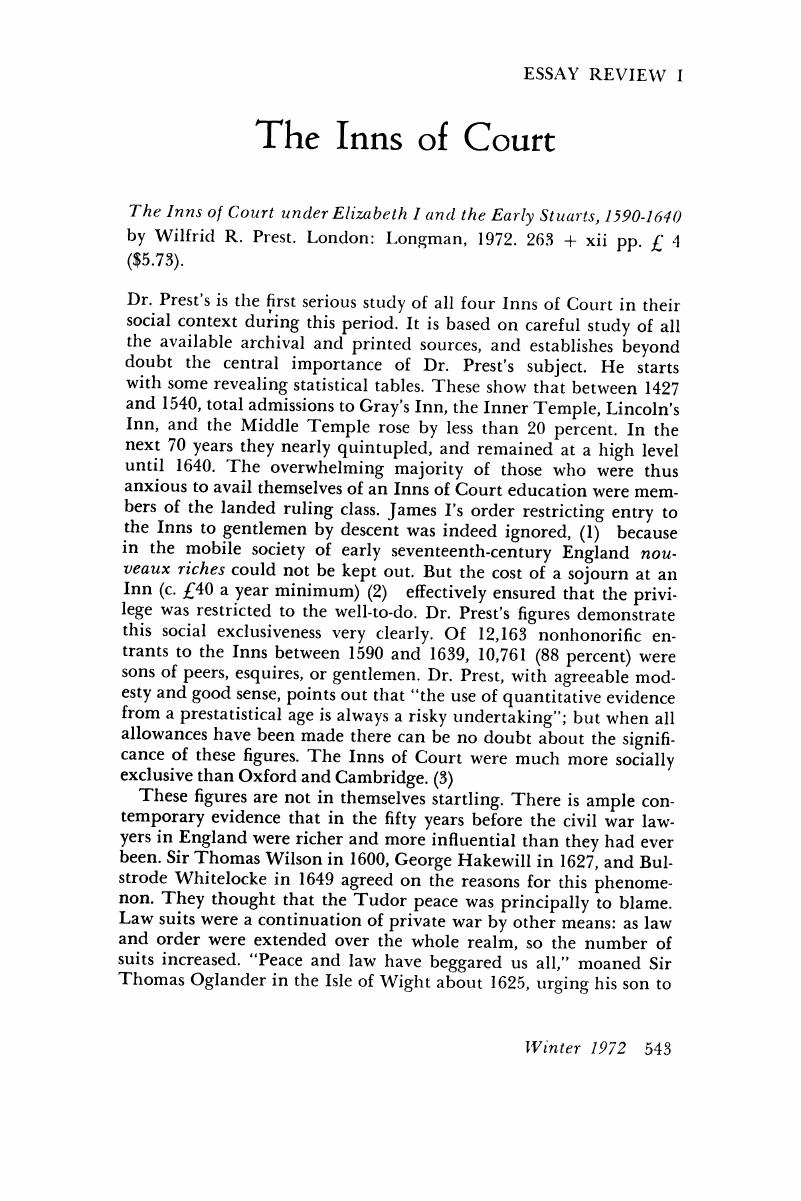No CrossRef data available.
Published online by Cambridge University Press: 24 February 2017

1. Prest, Wilfrid R., The Inns of Court under Elizabeth I and the Early Stuarts, 1590–1640 (London, 1972), p. 26.Google Scholar
2. Ibid., pp. 27–28.Google Scholar
3. Ibid., pp. 30–32.Google Scholar
4. Bamford, F., ed., A Royalist's Notebook (1936), p. 14.Google Scholar
5. Williams, P., The Council in the Marches of Wales under Elizabeth I (1958), pp. 61–4, 321.Google Scholar
6. Fisher, F. J., ed., Sir Thomas Wilson's State of England (1600), Camden Miscellany, vol. 16 (1936), pp. 24–25; G. Hakewill, An Apologie for the Providence of God, 2d ed. (1635), p. 548; B. Whitelocke, Memorials of the English Affairs (1682), pp. 416–17.Google Scholar
7. Turner, R. W., The Equity of Redemption (Cambridge, 1931), p. 30.Google Scholar
8. Charlton, Kenneth, Education in Renaissance England (London, 1965), p. 188. It is embarrassing to have to explain that to say this is not to claim Coke as a protagonist of laissez-faire. But since the view is attributed to me by Barbara Malament (“The ‘Economic Liberalism’ of Sir Edward Coke,” Yale Law Review, 75, pp. 1321–58), I must make it clear that I do not and have never held it. To demonstrate, as her article convincingly does, that Coke did not believe in laissez-faire is rather like proving that Adam Smith did not advocate a welfare state.Google Scholar
9. Jones, W. J., The Elizabethan Court of Chancery (Oxford 1967), pp. 497–98; cf. p. 321.Google Scholar
10. Davies, M. G., The Enforcement of English Apprenticeship (Cambridge, Mass., 1956), p. 151.Google Scholar
11. Jones, , Court of Chancery, pp. 461–62; R. Stock, A Commentary upon the Prophecy of Malachi (Edinburgh, 1865), p. 165. This last work was first published posthumously in 1641. Stock died in 1626.Google Scholar
12. Harrison, G. B., ed., De Maisse's Journal (1597) (1931), p. 12. In the French fashion De Maisse presumably included the gentry in the word “nobility.”Google Scholar
13. Hare, John, Englands Proper and onely way to an Establishment in Honour, Peace and Happinesse (1648), p. 6.Google Scholar
14. See my Intellectual Origins of the English Revolution (Oxford, 1965), pp. 260–63; The World Turned Upside Down (1972), pp. 216–18.Google Scholar
15. Jessup, F.W., Sir Roger Twysden, 1597–1672 (1965), p. 16.Google Scholar
16. London, William, A Catalogue of the Most Vendible Books in England (1657), Sig. G 2v-G 3.Google Scholar
17. Styles, P., “Politics and Historical Research,“ in English Historical Scholarship in the 16th and 17th Centuries, ed. Fox, L. (Dugdale Society, 1956), p. 70.Google Scholar
18. Rushworth, J., Trial of Strafford (1680), p. 662.Google Scholar
19. Stone, Lawrence, “The Educational Revolution in England, 1560–1640,“ Past and Present, no. 28, p. 28. (Mr. D. H. Pennington supplied the figures).Google Scholar
20. Hill, , Intellectual Origins, pp. 301–14. See also, Mark Curtis, Oxford and Cambridge in Transition, 1558–1642 (Oxford, 1959), passim.Google Scholar
21. Prest, , The Inns of Court, p. 153.Google Scholar
22. Ibid., pp. 153–57.Google Scholar
23. Ibid., p. 168.Google Scholar
24. Ibid, pp. 159–67.Google Scholar
25. Ibid., pp. 196–97.Google Scholar
26. Ibid., pp. 204–15, 223; cf. pp. 38 and 53Google Scholar
27. Ibid., pp. 41–43.Google Scholar
28. Ibid., pp. 100–14.Google Scholar
29. Ibid., pp. 236–37.Google Scholar
30. Ibid., pp. 170–73.Google Scholar
31. Warren, A., A New Plea for the Old Law (1653), quoted in D. Veall, Popular Movements for Law Reform, 1640–1660 (Oxford, 1970), p. 124.Google Scholar
32. Prest, , The Inns of Court, pp. 44–46.Google Scholar